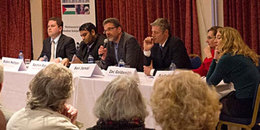Hung voters
Contrary to popular belief, the imminent election is not the US Presidential one but the UK's general exercise on May 7 - next Thursday as I write this. A week hence, the United Kingdom of Great Britain and Northern Ireland could be watching a government in formation by a coalition of Labour and the Scottish National Party. Or the Conservatives and everyone else (so much messier). The first of those intrigues. What if, instead of voting for independence, the Scots were simply to slowly take over in Westminster? The SNP leader, Nicola Sturgeon, seems to have the highest approval rating of any party leader ("she was like a breath of fresh air," a friend said this week, referring to the April 16 BBC debate), and why shouldn't SNP start fielding candidates south of the border? They'll need a different platform, of course: less Scottish independence, more..."these people in Westminster have done to you what they did to us; fight with us against a common enemy ".
Around my area, things haven't changed much since the 2010 polls. Five parties have fielded MP candidates: Conservative (incumbent, with polls predicting a much bigger majority this time); LibDem (the previous incumbents, back to the constituency's creation in 1997, and the only opponent with any chance); Labour; Green; UKIP. Nationwide, the LibDems have cratered since 2010 (the latest Guardian poll projects 27 seats, down from 57). So my choice is between someone whose party's policies I despise and someone who will have no influence whatsoever in Westminster. This is not satisfying, somehow. And it is a common conundrum.
Through the efforts of Democracy Club (which I recounted recently at TechPresident, I found a hustings this week where all five candidates appeared for questioning. The place was packed; this constituency's turnout in 2010 was 76.9%.
 Notably, the questions asked largely covered topics that feature frequently in media coverage: Heathrow expansion (a huge local issue); whether to cancel HST2; balancing the budget; welfare cuts; Britain's EU membership; lots of tax issues - "non-domiciles", mansions, assets. Questions usually have to be pre-approved by the organizers; at an earlier such event, a friend had no luck getting intellectual property questions onto the list.
Notably, the questions asked largely covered topics that feature frequently in media coverage: Heathrow expansion (a huge local issue); whether to cancel HST2; balancing the budget; welfare cuts; Britain's EU membership; lots of tax issues - "non-domiciles", mansions, assets. Questions usually have to be pre-approved by the organizers; at an earlier such event, a friend had no luck getting intellectual property questions onto the list.
There was a fair amount of entertainment value, much of it supplied by the - it has to be said, lame - UKIP candidate, who frequently found herself saying, "You may not agree with me..." Among the things we might not agree with her about: that staying in the EU means the young can't find affordable homes, and risks damaging the NHS. Her addendum to the (perfectly sensible) policy of saving £4 billion by scrapping HST2 was classic: "We have a pretty good Underground at the moment". A near-universal gasp at that: HST2 heads north from London to Birmingham, later beyond. Does she think it's on the Northern line? (Later, I realized she probably had HST2 confused with the in-progress east-west London link, Crossrail, but that doesn't make her look any more competent.)
It's all good fun, but in a couple of weeks real people are going to be grappling with the effects of real policies. The Open Rights Group, pointing out that this is the first general election since the Snowden revelations began, has a page suggesting ways to provoke candidates into discussing government surveillance, and find out both what they've said themselves and what their parties' policies are. ORG also has a page summarizing the party manifestos. Traditionally, the LibDems have been the most sensible of the parties on digital issues; now they compete with the Greens. The big Green advantage: they oppose TTIP, the little treaty that could bring down democracy.
Other manifesto summary pages to consult: the Drum analyzes press freedom; the Guardian considers technology; the Huffington Postalso looks at digital rights.
Looking over my wish list from the 2010 election, I see that we did get a number of the items listed: the ID card was scrapped, along with the national database and ContactPoint; libel got reformed (except, as this week's Private Eye points out, in Northern Ireland); we moved from large IT projects to small ones, and the Government Digital Service continues to push IT across government in that direction (so if they're going to fail, they fail quickly and cheaply instead of slowly and expensively). On the other hand, the battle to keep medical data confidential continues; Snowden's revelations still have not led to any serious public debate about government surveillance; the 2010-2015 government complained repeatedly about EU court judgments that defended our human rights against it; and much economic pain has been dumped on the already vulnerable. Many of the worst spy-on-us policies originated under Labour; the LibDems that we hoped would offer some protection against the worst Conservative polices will be castrated; and there's not actually a lot of hope from SNP, since their policies in Scotland have included privacy-invasive plans for an identity database and benefits cards.
It feels to me like everyone wants a change as much as the US did in 2008, but none is available, or at least none that will be on the ballot paper. What is a voter to do?
Wendy M. Grossman is the 2013 winner of the Enigma Award. Her Web site has an extensive archive of her books, articles, and music, and an archive of earlier columns in this series. Stories about the border wars between cyberspace and real life are posted occasionally during the week at the net.wars Pinboard - or follow on Twitter.